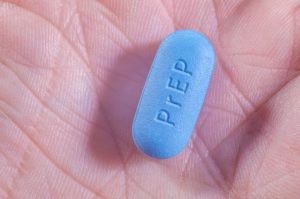
An estimated 1.3 million individuals worldwide acquired HIV in 2022, which marks a 38% decline in new HIV infections since 2010. While increased PrEP offerings and abundant testing opportunities have led to a decline in HIV among young people and for at-risk groups like men who have sex with men in the United States, one population has largely been left behind in HIV prevention — the currently incarcerated and justice-impacted individuals.
Prisons should offer abundant opportunities for HIV screening and comprehensive pre-exposure prophylaxis (PrEP) adherence programs to benefit incarcerated individuals and carceral systems as a whole. Justice-impacted individuals are at greater risk than the general population for contracting HIV outside of prison from high-risk activities like injection drug use, while activities like unprotected sex inside prison also risk transmission. With high recidivism rates in the United States, carceral systems can save money through comprehensive diagnostic programs inside prisons that prevent transmission, which is cheaper than what they might spend on long-term care for HIV positive incarcerated persons.
HIV prevalence among the prison population in the United States is 3-5 times greater than the non-incarcerated population, with few tools in place (such as condoms) to prevent transmission. In general, prisoner-prisoner relationships are often same-sex relationships because prisons are generally segregated by sex, which elevates the risk of contracting HIV through anal sex. After leaving prison, justice-impacted individuals are still at greater risk for contracting HIV and STIs than the general population. Former incarcerated individuals of Brooklyn, New York, for example, who had been incarcerated for a cumulative total of less than a year had an approximately 30% increased risk of currently having an STI, including HIV, and those who had been incarcerated for a year or more had an approximately 40% increased risk.
Despite clear benefits to incarcerated individuals, carceral systems under-utilize proven HIV prevention tools, such as HIV screening or the HIV prevention drug PrEP. Only some jurisdictions conduct and record HIV testing at intake, let alone offer opt-in screening services or PrEP. Recidivism rates in state prisons average around 68% for rearrests within the first three years after release. HIV-related medical costs for a person with HIV is an estimated $420,285 over a lifetime. The current approach to HIV care cycles incarcerated individuals through the carceral system, always at elevated risk for transmission and with few prevention tools, and then correctional health care must rely on tax dollars to cover otherwise preventable HIV medical costs.
There is already telehealth infrastructure in prisons that should be expanded to offer drop-shipped HIV and PrEP test kits. Remote PrEP programs are popular at scale in LBGTQIA+ communities, and similar ones should screen incarcerated individuals for HIV and enable them to complete routine lab tests for PrEP medication adherence. These remote programs would allow incarcerated individuals to complete quarterly PrEP lab tests for HIV, creatinine levels, and other STIs with a test kit. Kits come with a small finger-prick lancet, dried blood spot cards, and other materials to self-collect a blood sample, which lab technicians assess. Rather than conduct the screening at home, incarcerated individuals could perform self-collection tests with routine oversight. Similar public health programs could continue to support justice-impacted individuals on parole, mailing kits to their homes.
Ryan White Funding or 340B funding can finance HIV screening and PrEP medication maintenance programs. Some states also have PrEP assistance programs. Ryan White is authorized to support those with HIV who are incarcerated or otherwise justice-involved, while 304B funding can also discount the cost of the drug PrEP and expand testing in prisons. Correctional facilities can use funding to partner directly with home diagnostic companies that provide backend testing support, such as a provider of record API, shipment services, and kitting. They can also partner with boards of health or federally qualified health centers with screening and PrEP programs already in place.
By collaborating with federally qualified health centers or departments of public health, correctional health can establish comprehensive PrEP programs and HIV screening initiatives for incarcerated individuals. These collaborative efforts not only aid in curbing HIV transmission within prisons but also contribute to enhanced overall health outcomes for incarcerated individuals. Moreover, the implementation of such preventive measures serves as a fiscally responsible strategy, addressing the long-term healthcare costs associated with HIV care in prisons, particularly in the context of persistently high recidivism rates. These adaptable programs further extend their impact by ensuring continued medication adherence for individuals on PrEP post-release, facilitating the provision of drop-shipped test kits for use at home during parole.
Photo: MarcBruxelle, Getty Images
David Stein is the CEO of Ash Wellness, a B2B at-home diagnostic company launching remote care services for healthcare organizations and D2C businesses. Ash Wellness offers white-lable operations management, testing via a CLIA/CAP certified lab network, kitting and fulfillment, and modern technology infrastructure. In his role, David is responsible for mission vision, strategy oversight, fundraising, and corporate development. He is a graduate of the Cornell Tech MBA program.












